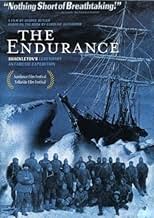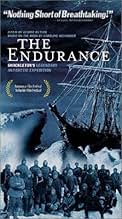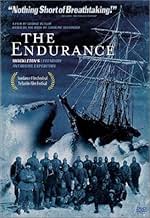Adicionar um enredo no seu idiomaIn December, 1914, the Endurance encountered ice packs before reaching 60º South - 400 miles north of Antarctica; an omen. The plan was to land at Vahsel Bay, which had never been done.In December, 1914, the Endurance encountered ice packs before reaching 60º South - 400 miles north of Antarctica; an omen. The plan was to land at Vahsel Bay, which had never been done.In December, 1914, the Endurance encountered ice packs before reaching 60º South - 400 miles north of Antarctica; an omen. The plan was to land at Vahsel Bay, which had never been done.
- Direção
- Roteiristas
- Artistas
- Indicado para 2 prêmios BAFTA
- 8 vitórias e 8 indicações no total
- Self - Narrator
- (narração)
- Hubert Hudson
- (narração)
- William Bakewell
- (narração)
- Alexander Macklin
- (narração)
- …
- Frank Wild
- (narração)
- (as Brian Darcy James)
- Frank Hurley
- (narração)
- Thomas Orde-Lees
- (narração)
- Walter How
- (narração)
- Ernest Shackleton
- (narração)
Avaliações em destaque
"The Endurance" tells the story of Ernest Shackleton's alternately miraculous and disastrous Antarctic expedition of 1914. For the bulk of the film's runtime, I was on the edge of my seat, gasping, overwhelmed by the horror and magnitude of the nightmarish conditions Shackleton and his men confronted. The men, stuck in Antarctica, watch their ship, their sole sure escape, crushed into a pile of toothpicks by heaving chunks of ice. A man wakes in the middle of the night to realize that the ice under his tent has shifted; he plunges, in his sleeping bag, into Antarctic Ocean. Sled dogs go from being trusted allies and team members to something starving men debate eating. These conditions didn't last for an hour or a day or a month, but for over a year.
Bad luck is followed by almost miraculous momentary deliverance. At one desperate point, the fate of his men hanging on his ability to carry out an almost impossible task walking non-stop for 36 hours across unmapped cliffs, mountains, and glaciers, after months of malnutrition and under-using the muscles in his legs Shackleton is convinced that a supernatural companion accompanies him. Mary Crean O'Brien, daughter of Tom Crean, who also made this trek with Shackleton, insists that that ghostly companion had been sent by "the man upstairs." One may scoff, but in this trek, Shackleton just missed a blizzard that, had he had to walk through it, would have certainly killed him. But what about all the bad luck that damned Shackleton and his men to their icy prison? This is a film that has you asking the big questions. Why do men do these crazy things? What does suffering mean, especially given how hard some people seek it out? Are these men greater than the rest of us, or merely mad? Where are frontiers, and heroes like this today? "Endurance" gets you thinking about culture. The British Empire gets a bad rap, but it did train its men to be honorable, and to live up to a code of conduct. Shackleton and his men were stoic, self-sacrificing, and learned to transcend class and ethnic differences. I had to wonder how a group of youths trained by our current values of whining, victimization, selfishness, identity politics and deviance would have responded under a similar catastrophe.
The film is beautiful to look at. The filmmakers traveled to the Antarctic and complement Frank Hurley's, antique, black-and-white film footage and still photographs with modern, color footage. The effect is mesmerizing. The modern film footage plunges you into the Antarctic; you will feel cold. You will contemplate turquoise shadows on pure white icebergs, ice-choked sea, and blizzards as aesthetic phenomena, as guardians of the last frontier, and as enemies who want to stop the blood in your veins and suck your body several fathoms down.
I have to confess that I found this film hard to watch. And I couldn't stop watching it. After it was done, I really needed time to decompress. Moment after moment juggles human lives and fates. I'll never forget this film, though, and its demonstration of the power of the human spirit.
Shackleton is described as a man who admittedly "was not really good at anything". He was simply looking for prominence in one of the last places one could find it at that time. The crew, an assortment of various sailors and craftsmen, were warned of the dangers and low pay of such a venture. However the chance of gaining acclaim for accomplishing such a feat was enough to get hundreds of men to sign up. The crew were chosen and the boat was set to sail at the outset of WWI. Shackleton actually offered to postpone his mission and donate his ship The Endurance to the war effort, but the government let him go, anyway. Ironically, the ship never even made it to Antacrtica before things went to hell. Nobody from this party ever set foot on the continent.
About 100 miles from the coast, the boat became hopelessly stuck in pack ice. Shackleton made the decision to wait until the following spring when the ice would break up to resume the trip. Before spring could come, however, The Endurance would be crushed by the ice. The crew were forced to shoot their sled dogs to save food rations. The last of the dogs were actually eaten by the crew. The crew were forced to then drag the remaining life boats several miles to open water where they would then have to island-hop their way to civilization in some of the coldest and most choppy seas on earth. Along the way, the group is splintered in three parts, as it just becomes impossible to transport so many men in the tiny lifeboats. Somehow, over the span of nearly two years, Shackleton and his men are eventually all rescued. There are some incredible individual acts of heroism, and even an odd case of mutiny along the way. But Shackleton's leadership and confidence always seems to keep the group alive.
Once the men return home, they find that their own heroism has been dwarfed by so many men who had given their lives on the battlefields of WWI. Many of Shackleton's crew enlist in the army to almost certain death, and one is left to wonder about the logic behind it all. To stay alive through impossible circumstances for nearly two years, then go out and give your life for one of the most pointless conflicts in human history? People's attitudes must have been somewhat different back then.
The film is a visual treat. Still and moving footage from the actual expedition is inter-cut with current shots of the areas these men traveled through. The scenery is breathtaking, and you get a real feel for how desperate these mens' circumstances really were. Liam Neeson narrates, and he gives the material even further dignity. After watching the film, you can't help but realize how insignificant we humans are in the scope of the natural world. How any of these men made it back alive is a miracle. Nature lives by its own rules, and any time we humans attempt to conquer it, we run the risk of falling victim to its indifference to our plight.
9 of 10 stars.
The Hound
Você sabia?
- Citações
Himself - Narrator: Optimism was at the very core of Ernest Shackleton's personality. Known to all as the "boss", he was a born leader who was from his youth driven by the romantic quest for adventure.
Principais escolhas
- How long is The Endurance?Fornecido pela Alexa
Detalhes
- Data de lançamento
- Países de origem
- Idioma
- Também conhecido como
- The Endurance
- Locações de filme
- Empresas de produção
- Consulte mais créditos da empresa na IMDbPro
Bilheteria
- Faturamento bruto nos EUA e Canadá
- US$ 2.453.083
- Fim de semana de estreia nos EUA e Canadá
- US$ 18.931
- 7 de out. de 2001
- Faturamento bruto mundial
- US$ 2.453.083
- Tempo de duração1 hora 37 minutos
- Cor
- Mixagem de som
- Proporção
- 1.78 : 1
Contribua para esta página





















